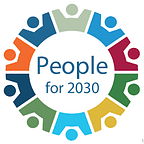Women in Tech Series: Bringing energy to all corners of the world with Julia Schramm
The Women in Tech series puts the spotlight on women who are championing the advancement of transformative technology and digital innovations across UNDP. By sharing these inspiring individual stories, we hope to encourage others to choose this path and spur gender equality in the digital sector.
“You know when kids are out drawing or playing games in restaurants, my mom would give me math problems because I liked solving them. I don’t think I ever considered doing anything else than engineering.”
After studying Environmental Engineering and Renewable Energy for about eight years, Julia Schramm is now working as a Green Energy Specialist in UNDP’s Green Energy team.
“I was always interested in the energy sector and its potential. I guess it started with a naïve idea of saving the planet, that later matured as an interest in solar energy as a means to make a positive impact,” Julia shares.
After writing her bachelor thesis exploring energy production from waste, Julia started exploring the potential of solar energy, which made her move to Lisbon for a master’s in renewable energy before joining UNDP in Copenhagen as an intern in 2019.
She progressed to become a core part of UNDP’s Green Energy team where she now leads project development and oversees solar energy installations around the world.
The social impact of electricity
Since joining UNDP, Julia has had the opportunity to support the implementation of green energy installations in seven countries, moving beyond UN offices to also work in remote locations and indigenous communities. Julia emphasizes how this type of work not only has a climate impact but also has an important social aspect.
“When you see the impact of a solar system in a remote location that was previously depending on unreliable electricity from the local grid, you really understand the difference this can make.”
“If you haven’t experienced it yourself, it is difficult to imagine how hard life can be when you cannot rely on a stable electricity connection. Having a steady energy supply means you will have light in the evening for your children to do their homework, regardless of power cuts,” Julia reflects.
But it is more than providing electricity in areas previously unconnected from the grid. Leveraging solar energy means that power comes from a sustainable source.
“We could just help these locations to install a generator for example, but that would mean providing electricity from a polluting source that would bring about many bad consequences for that place. By using solar energy, we are in a way combining the best out of two worlds — providing both reliant and clean energy.”
Closing the loop
The work of the Green Energy team goes beyond implementing and designing solar energy installations such as PV systems, solar lamp and electric vehicles, to also include a research element. The team is strengthening support in areas such as energy efficiency to enable UN agencies reduce their overall electricity consumption and much research is also going into developing solutions for the afterlife of their products. Julia is leading an e-waste pilot project, where she is initiating collaborative discussions with other UN country offices to improve overall electronic waste management practices across UNDP.
“We need to think about what to do with these batteries and solar panels when they reach the end of their life. By rethinking end-of-life and recycling opportunities we are closing the loop and preventing these products from being thrown away or ending up in landfills. “
As a female engineer you meet some surprise, although engineering is a male-dominated field, like much of the STEM professions, UNDP’s Green Energy unit is a majority female team.
“I think we were five women among 30 men in my university class. So coming from this type of context, it is quite amazing. It brings a lot of energy to work with young women who are all so engaged in the cause.”
However, being a woman in this field does sometimes come with challenges, which Julia often encounters when she is on mission.
“Sometimes you meet surprise, as people are not used to seeing a woman doing this job, but I have also been met with doubt, where people do not think I can perform my job. In these situations, you just need to remember that we are all as capable as anyone else regardless of gender.”
